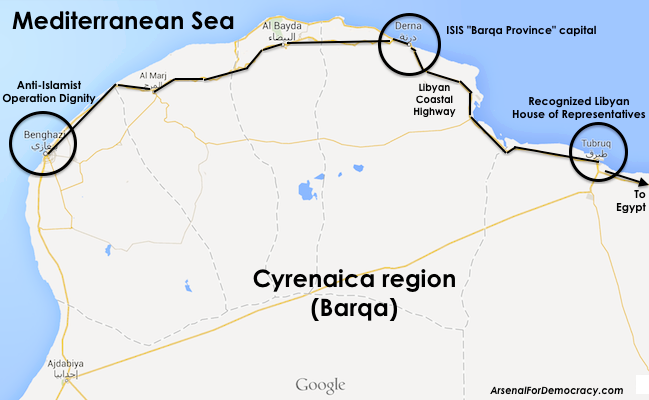It’s pretty hard to tell what’s going on in Libya right now, even for the people there…
First, a quick recap of the year to present before today’s big event:
Earlier this year, an anti-Islamist former Army general, Khalifa Hifter, attempted to seize power in western Libya unsuccessfully. That effort having failed, Hifter regrouped and launched a rogue “security operation” to try to unilaterally clear eastern Libya of pro-Islamist militias in the city of Benghazi. This appeared to work for a time, and he tried to seize power in western Libya again, also without much effect. That was probably the high point of his efforts, in hindsight.
In August, the newly elected anti-Islamist government fled to Tobruk (in the east, in the coastal district next to Egypt) from Tripoli (the capital, in the west) as the latter city fell to pro-Islamist militia forces who supported the previous government. I speculated that this geographical repositioning — to the safest possible area away from Islamist factions — might signal either an imminent coup or an impending request for intervention from the anti-Islamist military government of President Sisi next door in Egypt. Shortly thereafter, mysterious fighter jets appeared over Tripoli and bombed rebel positions. The United States government announced after several days that it believed the airstrikes had been from the United Arab Emirates Air Force with support from Egyptian air bases, a claim Egypt denied officially and loudly.
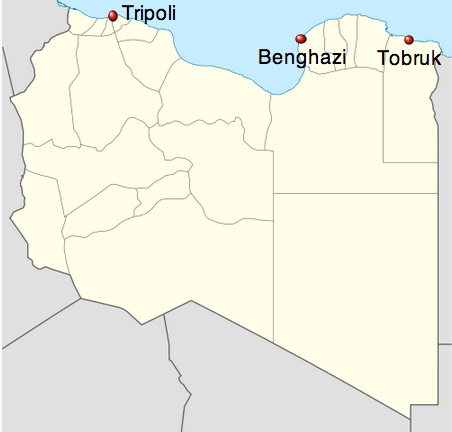
Map of three coastal cities in Libya. Adapted from Wikimedia.
Instead of those airstrikes beating back the pro-Islamist militias in western Libya, the militias simply gathered themselves up and launched a concerted offensive on eastern Libya. They entered the city of Benghazi in recent weeks, leaving many Hifter sympathizers to flee to places like Tobruk (though he himself is reportedly still in Benghazi). Military barracks and other key sites of the anti-Islamist renegades and the official armed forces rapidly fell.
So what happened today?
Well, nobody is sure exactly, but we do know that mystery jets appeared again and bombed Islamist positions, this time in Benghazi (AP).
So who’s behind it?
The Associated Press got anonymous sources inside the Egyptian military to say that this was an Egyptian Air Force operation:
Egypt deepened its involvement in the fight against Islamist militias who have taken over key parts of Libya on Wednesday, with officials saying Egyptian warplanes have bombed their positions in the eastern city of Benghazi.
The two officials, who have firsthand knowledge of the operation, said the use of the aircraft was part of an Egyptian-led campaign against the militiamen that will eventually involve Libyan ground troops recently trained by Egyptian forces.
Publicly, and at the highest levels, Egypt again denied this had occurred.
The official line either way seems to be that the anti-Islamist government internally exiled to Tobruk, not far from the border with Egypt, authorized whatever happened:
The operation, they said, was requested by the internationally recognized Libyan administration based in the eastern city of Tobruk.
A prominent Libyan legislator, whose father heads the Libyan Air Force, also denied that Egypt itself had bombed Benghazi, claiming to the AP instead that they were loaner planes:
Libyan lawmaker Tareq al-Jorushi confirmed to the AP that Egyptian warplanes were taking part in the ongoing operation in Benghazi, but said that they were being flown by Libyan pilots. He says the planes were “rented” by the Libyan administration from Egypt. Al-Jorushi is awaiting confirmation of his appointment on the Tobruk-based parliament’s national security committee, which is responsible for such issues. He is also the son of the head of Libya’s air force, Gen. Saqr al-Jorushi. He said he learned that the planes are Egyptian from the new chief of staff
A Benghazi militia commander opposing the militarists and the Tobruk government offered this intelligence to the media:
Earlier on Wednesday, a top Islamic militia commander based in Benghazi said Egypt sent its warplanes to hit his group’s positions.
“We have photographs of the Egyptian warplanes and Egyptian naval forces stationed in eastern cities,” he told the AP. He said the planes were taking off from an airport in Libya’s eastern city of Bayda.
Bayda is a coastal city about halfway between Benghazi and Tobruk.
Read more
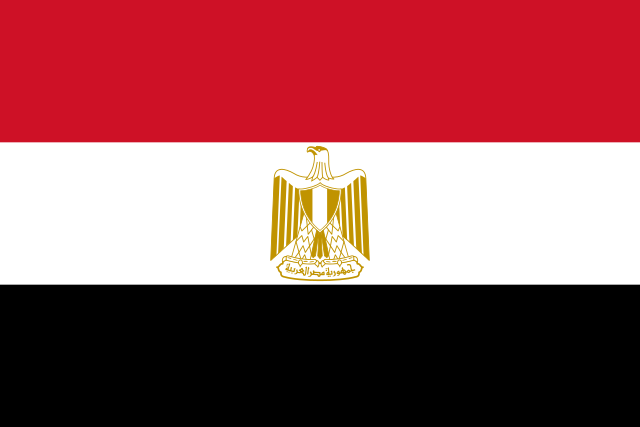



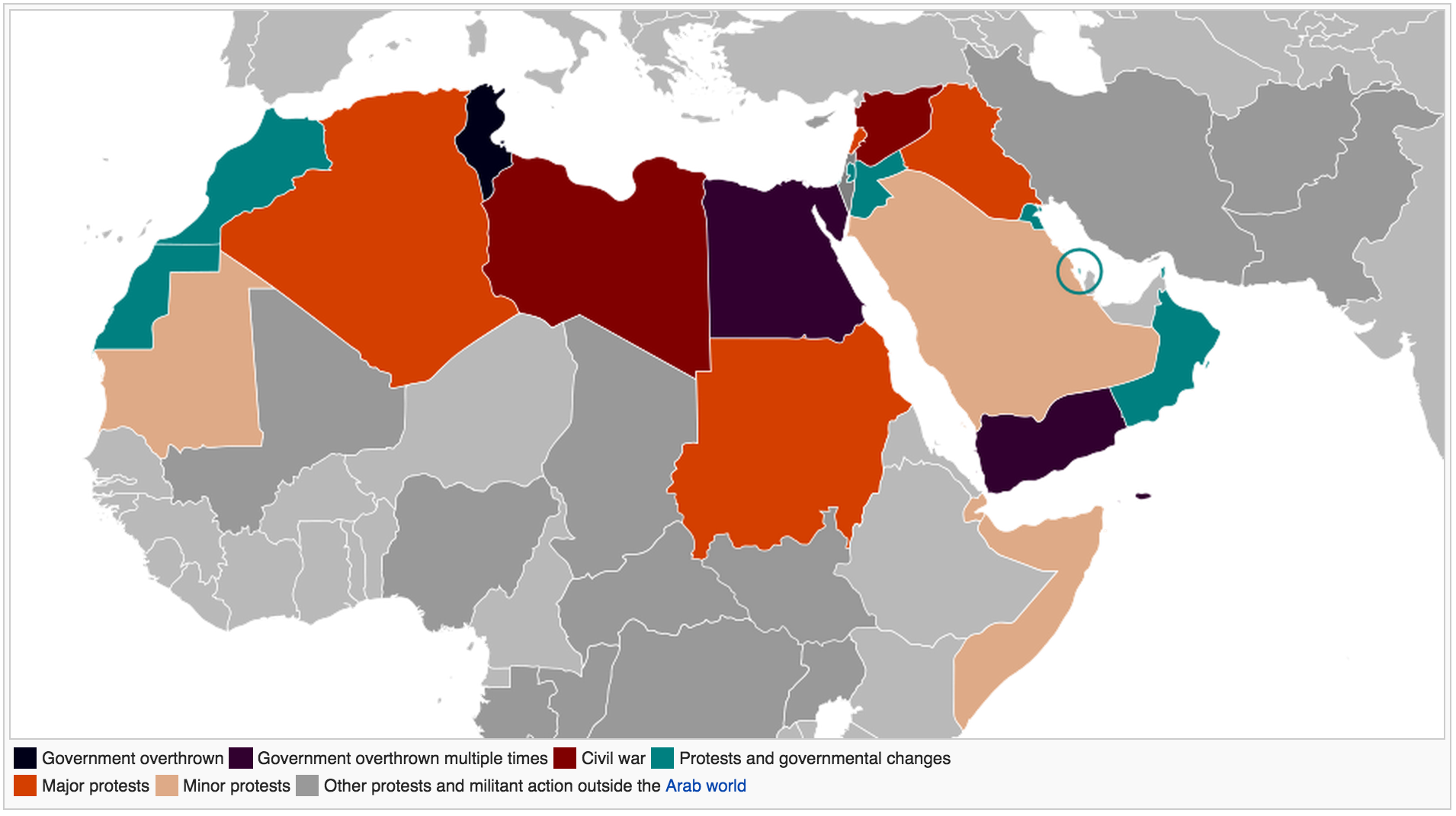
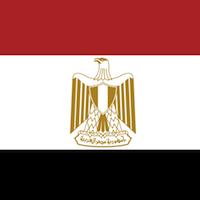 Egypt’s military-supported “secularist” government under former General Sisi picked a new Justice Minister
Egypt’s military-supported “secularist” government under former General Sisi picked a new Justice Minister 